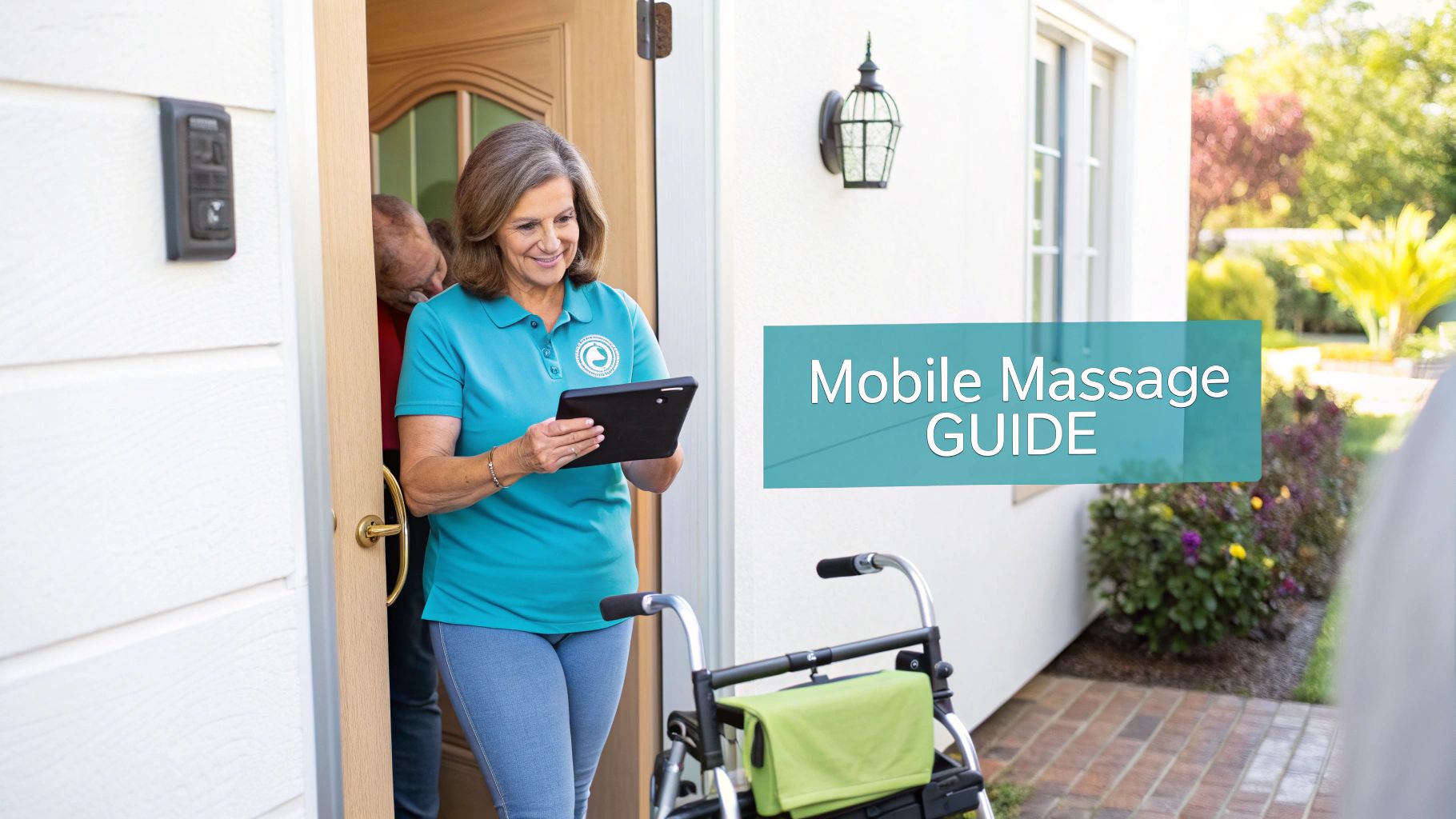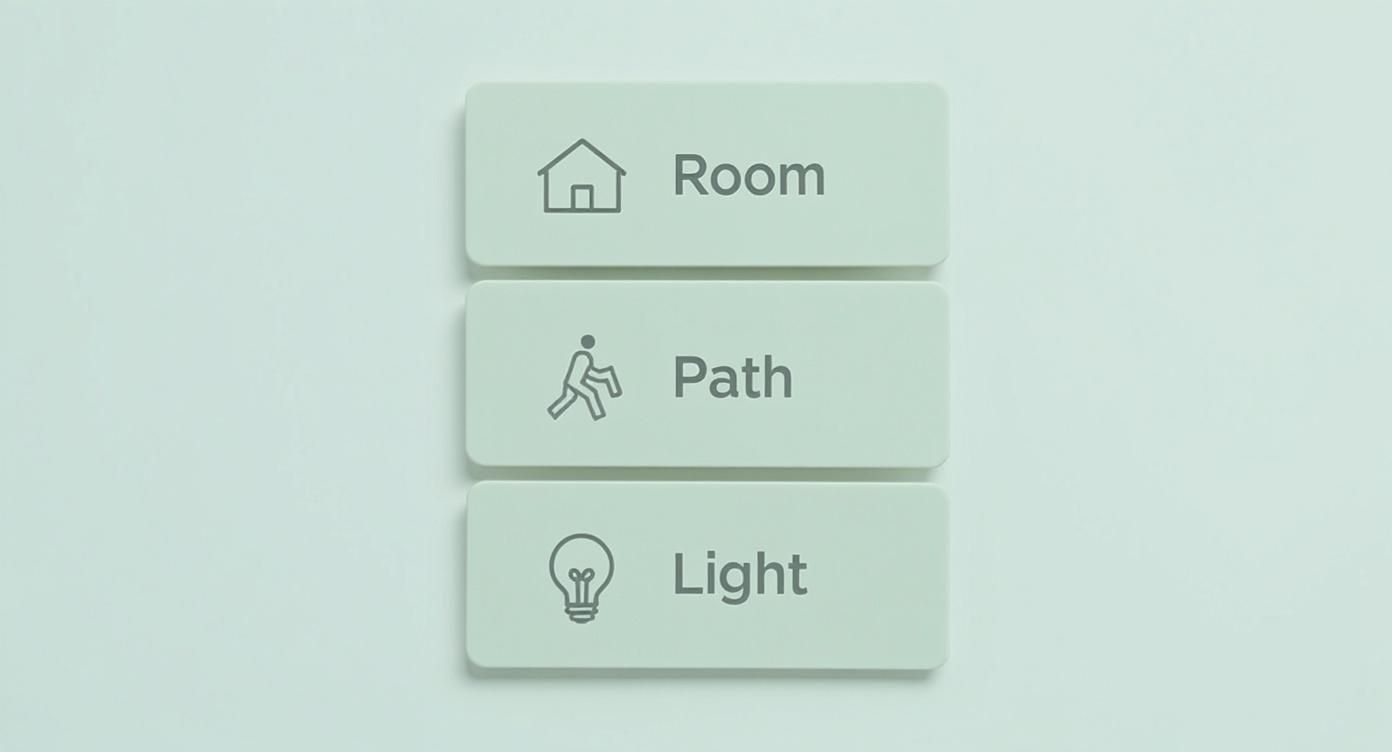Mobile Massage Therapists for Senior Wellness
- tmcpnet
- Nov 19, 2025
- 13 min read
Mobile massage therapy brings the spa experience right into your loved one’s living room. Seniors benefit from professional Registered Massage Therapists who navigate mobility challenges with ease, delivering relief where it’s needed most. We serve Brampton, Toronto, Etobicoke, Oakville, Caledon, Orangeville, Mississauga, Milton, Halton, and Guelph. Our services include Swedish massage, Cupping therapy, Deep tissue massage, Rehabilitation massage, Myofascial release, Trigger point release, Joint mobilization, Hydrotherapy applications, Geriatric massage, Sports massage therapy, and Energy healing.
Essentials Of Mobile Massage Therapists For Seniors
Registered Massage Therapists (RMTs) at Stillwaters Healing & Massage complete 500+ hours of approved training and uphold all provincial licensing standards. They arrive equipped with portable tables, non-slip mats and clear pathways to ensure every session is safe and comfortable.
Verify the therapist’s licence on the provincial registry and skim recent client reviews for honest insights.
Clear a well-lit corner of furniture and rugs to create a hazard-free treatment space.
Discuss pain levels, preferred techniques and any health precautions before the first stroke.
Confirm upfront what’s included in the rate—standard session fees, travel charges and accepted insurance.
Keep feedback flowing during the massage so pressure and focus areas can be adjusted on the spot.
Why In-Home Massage Works
Eliminating the commute means more time for actual treatment—and less fatigue for seniors. In familiar surroundings, clients relax faster and open up about discomforts they might otherwise downplay.
“Having a therapist come to our home made all the difference. My mother’s mobility improved and her arthritis flare-ups eased within just a few sessions.” – Family caregiver

Below is a quick action plan to guide you through every step of arranging senior mobile massage care.
Key Steps For Senior Mobile Massage Care
Step | Focus Area | Key Action | Notes |
|---|---|---|---|
1 | Credentials | Verify RMT licence | Check provincial registry and read reviews |
2 | Accessibility | Clear treatment area | Remove trip hazards; ensure good lighting |
3 | Communication | Discuss preferences | Outline pressure levels and pain points |
4 | Session Setup | Confirm logistics | Agree on time, location and necessary supplies |
5 | Pricing | Review full cost | Discuss session rate, travel fees and coverage |
Use this table as a quick reference to cover every detail before the first appointment.
Learn more about the benefits of mobile massage services in Brampton and Caledon in our detailed guide.
Key Takeaways For Caregivers
Every successful in-home massage starts with clear credentials and a safe environment.
Keep a jug of water and fresh towels within easy reach.
Ask the therapist for simple follow-up stretches to reinforce each session.
Schedule appointments at regular intervals to track progress and adjust the care plan.
With these essentials in place, inviting a skilled therapist like Taylor into your home becomes a stress-free experience. Expect tailored care, consistent relief and a gentle boost in flexibility every time.
Finding And Vetting Mobile Massage Therapists
Searching for a mobile massage therapist who genuinely understands the needs of seniors or someone with limited mobility doesn’t have to be stressful. A few reliable steps and trusted resources will guide you to licensed practitioners ready to bring professional care right to your doorstep.
Using Trusted Directories And Referrals
Professional registries and peer recommendations can save you hours of guesswork. Provincial RMT listings confirm valid credentials, while personal referrals reveal how practitioners perform in real homes.
Verify registration details and licence expiry online.
Read client comments on punctuality, pressure control and bedside manner.
Confirm liability insurance and proof of recent TB clearance upfront.
These checks point you to therapists who already have a track record of safe, respectful service.
Real Scenario Contacting Taylor
Picture this: you ring Stillwaters Healing & Massage and ask about Taylor’s availability for your mother in Mississauga. The receptionist outlines his travel fees, offers a few booking slots and encourages you to share any specific access needs.
That brief phone call delivers plenty of insight:
How quickly they respond.
Clarity around fees and timing.
Willingness to discuss special training.
You learn whether Taylor has completed modules in geriatric massage or joint mobilisation—vital qualifications for seniors’ comfort.
“Seeing Taylor’s experience with seniors eased our concerns and built trust from the first call.”– A caregiver testimonial
Verifying Credentials And Training
In Ontario, every registered massage therapist must finish at least 500 hours of approved education or succeed in a qualification exam. Checking your candidate’s registration number on the provincial registrar’s site ensures you’re dealing with a fully licensed professional.
Confirm active public liability insurance that covers in-home work.
Look for certificates in geriatric or rehabilitation massage workshops.
Cross-check training hours against industry standards.
For more on these certification requirements, see the CAMTC background paper.
Asking The Right Vetting Questions
A short chat can reveal how a therapist handles the realities of in-home care. Focus on communication, safety and adaptability.
What happens if pain spikes mid-session?
How do they navigate tight spaces or assistive devices?
Do they recommend home modifications—grab bars, walker-friendly arrangements or clear pathways?
These queries uncover not just expertise, but the therapist’s mindset toward accessibility and client comfort.
Final Checklist For Vetting
Before you lock in your first appointment, compare candidates with a simple matrix:
Criterion | What To Look For | Why It Matters |
|---|---|---|
Licence Status | Valid RMT registration with up-to-date expiry | Guarantees legal practice |
Training Hours | 500+ hours documented | Validates clinical competence |
Insurance | Active liability policy covering home visits | Protects both client and therapist |
Client Feedback | Positive reviews from seniors or mobility-limited | Reflects real-world satisfaction and trust |
Specialisations | Geriatric, rehab or joint mobilisation modules | Matches specific health and mobility needs |
Comparing a few professionals on these points helps you feel confident about their skill set, their approach and their flexibility.
Key Takeaways- Prioritise valid licences and documented 500+ hours of training.- Confirm in-home liability insurance and ask about accessibility strategies.- Leverage senior-focused reviews and caregiver referrals to gauge real-life effectiveness.- For a deeper dive into finding a reliable therapist in the GTA, explore Find a Mobile RMT Near Me in the GTA.
Preparing Your Home For A Massage Session
A skilled mobile massage therapist brings relief right to your doorstep. Small tweaks around the house can turn your living space into a calm, safe sanctuary. Once you’ve done the groundwork, Taylor steps in and gets straight to work.
Choosing The Right Room
Look for a peaceful corner with minimal foot traffic. A spare bedroom or a cleared section of the living room usually does the trick. Many Oakville families tuck a massage table into their upstairs guest room for extra quiet.
Clear paths around furniture so walkers or wheelchairs glide through easily. That small change cuts down on trip risks and speeds up setup time.
Remove loose rugs and wires to keep pathways obstruction-free.
Position a sturdy chair nearby for quick rests or adjustments.
Ensure the floor is flat—no wobbling under the massage table or stool.
Adjusting Lighting And Temperature
Gentle illumination eases eye strain and sets a soothing mood. A dimmable lamp or curtains that filter sunlight strike the right balance between clarity and calm.
Aim for 22 °C. Seniors often appreciate a touch of extra warmth, especially in the early hours. Keep a portable heater on standby if needed.
“A warm room helped my mother relax the moment Taylor walked in,” shares a caregiver in Mississauga.
Organising Stable Furniture And Equipment
Place the massage table on solid ground, locking the legs per the manufacturer’s instructions. A non-slip mat underneath adds that extra peace of mind.
Pillows or bolsters under the knees and lower back can make a world of difference. One Caledon client saw immediate relief simply by tucking a firm cushion under her knees.
Place a water station—a jug and glasses on a small side table.
Prepare fresh towels—neatly folded within arm’s reach.
Have sanitiser ready—to reassure everyone before and after the session.
You can download a printable checklist from our site to tick off every item, from towel counts to room temperature.Check out our detailed setup tips in Your Guide to In-Home Massage in Toronto for step-by-step visuals.Use this link for added clarity and region-specific advice: https://www.stillwatershealing.ca/post/your-guide-to-in-home-massage-in-toronto
Compact Packing Guide
Gather all essentials in one basket or tote by the doorway. That way, if you realise you need an extra bolster or a fresh sheet, it’s already on hand.
Extra pillows and bolsters for targeted support
Clean sheets and pillowcases
Disposable face cradle covers
Hand sanitiser and disinfectant wipes
Mobility aids (walker grips, foldable ramp)
Throw in towel clips or a pair of non-slip socks for clients with limited mobility. These thoughtful touches show you’ve considered every detail.
Allow Extra Time For Setup
Block out an extra ten minutes before Taylor arrives. This buffer lets you double-check routes, lighting, linens and equipment. With everything in place, the session starts smoothly—no last-minute dashes or surprises.
Final Checklist
Take one last walk-through. Test the lighting, feel the floor, measure the temperature and visualise each step. This little rehearsal can prevent mid-session interruptions.
Key TakeawayA clear, safe and welcoming space lets mobile massage therapists like Taylor concentrate on healing, not housekeeping.
A well-prepared home amplifies the benefits of any technique—Swedish, deep tissue or gentle mobility work. And don’t forget to have fresh drinking water at the ready: proper hydration supports better circulation and speeds recovery once the massage ends.
During Your In-Home Massage Session
When your therapist steps inside, you’ll notice their compact kit ready for quick setup. A warm greeting lets you know they’re focused on your comfort from the very first moment.
They’ll take a moment to confirm clear pathways and proper lighting, then review any medical notes you’ve shared.
Set the room temperature to about 22 °C
Adjust lights to minimise glare and shadows
Position a water jug and fresh towels within arm’s reach
Adjusting Draping And Therapy Techniques
Maintaining privacy is essential. Crisp linens cover everything except the area being worked on, respecting your dignity while keeping the session smooth.
You might start with gentle Swedish effleurage to warm up muscles. If deep tension has built up, expect firmer strokes that target knots without crossing comfort lines. When cupping or energy work comes into play, clear communication on pressure ensures you’re always in control. And with joint mobilisation, those gentle manoeuvres help your flexibility improve bit by bit.

That graphic shows how a well-lit room, clear walking paths and uncluttered space can cut setup time by about 20%, so you get right to the treatment you came for.
Comparison Of Mobile Massage Techniques
Here’s a quick snapshot of popular services, their perks and which clients benefit most:
Technique | Primary Benefit | Duration | Ideal For |
|---|---|---|---|
Swedish Massage | Relaxing soft tissues | 45–60 min | First-time clients |
Deep Tissue Massage | Loosens deep knots | 60–75 min | Persistent tension |
Cupping Therapy | Boosts circulation | 30–45 min | Localised tightness |
Energy Healing | Harmonises energy flow | 30–60 min | Stress reduction |
Joint Mobilization | Improves joint mobility | 15–30 min | Stiff or arthritic joints |
Use this chart to guide your choice. For example, combining Swedish strokes with joint mobilisation can ease arthritis discomfort in under an hour.
Managing Pressure And Feedback
Open dialogue keeps the experience custom-fit. Therapists often pause and ask for a thumbs up or a gentle tap to check that the pressure feels right. One client in Milton, Ms Patel, preferred lighter strokes and a small bolster under her knees—and immediately noticed relief.
“A brief breathing pause every 10 minutes can boost relaxation by 25%,” says our expert therapist, underscoring how small pauses and clear feedback enhance every session.
Optimising Comfort With Equipment
A few simple props can make a big difference:
A knee bolster reduces lumbar strain
A head support eases neck tension
Rolled towels under shoulders provide extra lift
These tweaks keep you cosy and let the therapist focus on hands-on healing.
Final Touches And Aftercare
As the session winds down, you’ll learn gentle stretches—think neck rolls and shoulder circles—to lock in your gains.
Sip at least 250 mL of water within 15 minutes
Try seated lumbar twists to maintain flexibility
A quick follow-up call within 24 hours checks your progress and helps plan your next appointment. Clear communication and these simple best practices ensure you’ll get the most out of every in-home session.
Personalizing Your Senior Care Plan
A meaningful care plan begins with a clear snapshot of health history and personal goals. For seniors or clients with limited mobility, details like past surgeries, arthritis flare-ups and medication timings guide a mobile massage therapist’s approach.
Tracking daily routines reveals the moments when stiffness peaks or energy drops. That insight directs sessions toward myofascial release or gentle joint mobilisation at just the right time. Families and caregivers can then notice subtle improvements and tweak home support accordingly.
Sample Care Plan Templates
A simple table can keep everyone aligned:
Component | Details |
|---|---|
Medical Summary | Surgeries, diagnoses, allergies, current medications |
Daily Log | Pain level, mobility score, mood before each visit |
Session Goals | Targets such as improved shoulder range or reduced knee stiffness |
Technique Choice | Myofascial release, trigger-point therapy, hydrotherapy |
This blueprint ensures each appointment has a clear purpose. Families fill in observations while Taylor brings professional know-how.
“A checklist helps us track 4-week milestones and celebrate real gains in flexibility,” says Taylor, RMT.
Clients recovering from joint surgery often alternate deep tissue massage with joint mobilisation. Myofascial release can then ease tight scar tissue. Together, these methods foster steady progress and reduce discomfort between visits.
Coordinating With Family Caregivers
Involving loved ones turns therapy into a team effort. Before each session, share any posture changes or new pain areas. Afterwards, practise recommended stretches or light hydrotherapy under family supervision.
Pre-Session Prep ensures the treatment space is clear and accessible.
Post-Session Support encourages 250 mL of water intake and a 10-minute rest period.
Routine Reminders prompt short walks or gentle yoga using Taylor’s notes.
Fall Prevention Drills boost balance through simple steps; learn more in our guide on preventing falls in elderly practical safety tips.
Working Directly With Taylor RMT
Honest feedback shapes every massage. Use a basic pain scale or a thumbs-up system during treatment to adjust hand pressure and techniques. Plan brief catch-ups every 4 weeks to review progress and set new objectives.
Weekly Check-In: Caregivers send a quick recovery note after each visit.
Phase Planning: Taylor adapts methods—swapping Swedish strokes for deeper work as muscles respond.
Milestone Review: Establish goals like a 15 % reduction in stiffness or a 2° gain in joint range.
Monitoring Progress And Adjusting Goals
Consistent logging turns impressions into insights. Review session notes monthly to spot trends in pain or movement. That data lets Taylor fine-tune the blend of modalities—perhaps adding more trigger-point work or easing back to Swedish massage.
Pain Trend Chart: Record discomfort on a scale from 1 to 10 each day.
Mobility Dashboard: Track walking duration or range-of-motion measurements.
Technique Feedback: Highlight which approaches felt most effective.
Next Steps: Agree on any tweaks to home exercises or appointment frequency.
Maintaining these records builds a living history that keeps everyone focused on what works. Collaborative planning not only boosts treatment effectiveness but also helps seniors feel supported and confident.
Contact Taylor today to discover how a truly personalised care plan can enhance senior well-being.
Pricing Insurance And Contraindications

Arranging in-home massage can feel like solving a puzzle—so many numbers, so many options. A clear snapshot of hourly rates, travel fees and package savings goes a long way to easing stress. Below, you’ll find straightforward comparisons of private-pay versus insured sessions, all tuned to seniors managing chronic conditions.
Comparing Travel Fees Across Regions
Travel fees help therapists cover fuel, parking and setup time. Naturally, rural visits carry a slightly higher charge.
Region | Travel Fee |
|---|---|
Brampton | $25 |
Toronto | $20 |
Etobicoke | $22 |
Oakville | $25 |
Caledon | $30 |
Orangeville | $35 |
Mississauga | $20 |
Milton | $28 |
Halton | $27 |
Guelph | $30 |
Travel fees reflect distance and setup time—and keep services sustainable.
Understanding Hourly Rates And Packages
Across the GTA, expect $100–$150 per hour for a mobile massage therapist. Travel charges vary by location, from $20 in Mississauga up to $30 in Guelph. Booking multiple sessions often unlocks 10–15% in savings.
For a broader perspective, mobile therapists in California earned an average of $34.01 per hour (November 2025), with seasoned pros reaching $52 and newcomers around $22. Details on these wage findings are available at ZipRecruiter.
Key options include:
Single session rate with clear cost breakdown
Kilometric charges tied to distance
Prepaid packages for frequent visits
Bulk bookings can lower cost per visit by up to 15%.
Managing Shorter Session Options
Not every client needs—or can sit through—a full hour. Many therapists offer 30-minute and 45-minute visits to match both budget and stamina.
30-Minute Sessions run at about 60% of the hourly rate, targeting specific tension spots
45-Minute Sessions use roughly 80% and allow a mini full-body routine
Ask about family or caregiver discounts for regular care
Short bursts keep treatments consistent without stretching budgets.
Insurance Coverage And Billing Options
Most extended health plans cover around 80% of mobile massage costs. Always double-check your policy’s massage therapy clause, annual limits and any referral requirements.
Veterans often receive coverage for a set number of visits each year. And for families who’d rather skip the receipts pile, direct billing simplifies reimbursement.Learn more about direct billing for massage in Brampton and the GTA: https://www.stillwatershealing.ca/post/your-guide-to-direct-billing-massage-in-bramton-the-gta
To streamline claims:
Verify the RMT’s licensure and provider number
Obtain any required pre-approval or physician referral
Submit claim forms through your insurer’s portal
Watch for reimbursements—some plans process in 1–2 weeks
Insurers may cap coverage at 20 visits per year. Exceeding that limit means switching to private-pay or exploring charitable care days. Group plans sometimes pre-approve extras, so check co-pay responsibilities to avoid surprises.
Billing Method | Out Of Pocket | Paperwork | Typical Wait Time |
|---|---|---|---|
Private Pay | 100% | Receipt only | Immediate credit |
Direct Billing | 0–20% | Provider forms | 1–2 weeks |
Veterans Benefits | 0% | Referral letter | 3–4 weeks |
Contraindications And Safety Guidelines
Certain health issues need a doctor’s okay before hands-on work. Here’s a quick checklist:
Uncontrolled hypertension demands a medical note
Fever or open wounds call for postponement
Blood-thinning medications require a risk assessment
Recent surgery (under 6 weeks) means gentle joint mobilisation only
Osteoporosis or severe arthritis may need technique tweaks
Some conditions don’t rule out massage but do call for lighter strokes:
Varicose veins or clot risk—stick to superficial moves
Cognitive impairments—ensure clear cues and a calm setting
Always prioritise client safety: consult a healthcare professional if you’re unsure.
Actionable TipIf a condition seems borderline, ask for a brief medical evaluation form from the client’s doctor. This quick step keeps every session safe and compliant.
It’s completely normal to have a few lingering questions, even after you’ve done all the prep work. Getting those questions answered is the final step to making sure your first mobile massage session is comfortable, safe, and truly beneficial.
What If I Need to Cancel an Appointment?
Life is unpredictable, and any good therapist gets that. Most mobile massage therapists, like Taylor, just ask for 24 hours' notice if you need to cancel. This is a pretty standard professional courtesy, as it gives them a chance to offer that time slot to another client in areas like Brampton or Milton who might be on a waiting list.
It's always a good idea to double-check their specific cancellation policy when you first book. Usually, a quick text or email is all it takes to reschedule for a better time.
How Can I Be Sure My Therapist Is Qualified?
This is a fantastic and important question. For your safety and peace of mind, you should always verify a therapist's credentials. In Ontario, every Registered Massage Therapist (RMT) must be in good standing with the College of Massage Therapists of Ontario (CMTO). You can easily check this by looking up your therapist’s name on the CMTO public register.
A true professional will be completely open about their qualifications. Don't ever feel shy about asking for their registration number or to see proof of liability insurance before they even walk through your door.
The move toward in-home wellness isn't just a small trend; it's a significant shift. For example, California's massage therapy market is expected to grow by 22% through 2032, which really shows how much people value accessible, professional care. You can read more about the growing demand for professional massage therapists on NaturalHealers.com.
Are There Special Considerations for Certain Health Conditions?
Yes, absolutely. This is probably one of the most critical conversations to have with your therapist before they start.
Osteoporosis: Anyone with osteoporosis needs a much gentler touch. Deep tissue work over fragile bones is a definite no-go.
Hypertension: If your blood pressure isn't well-controlled, your therapist might ask for a doctor's note just to be sure a massage is safe for you right now.
Diabetes: A therapist needs to be aware of potential circulation issues or neuropathy, especially in the feet, and adjust their technique accordingly.
Being upfront about your health history isn't just a formality—it's what allows a skilled mobile RMT to tailor the treatment specifically for you, making sure it’s both helpful and entirely safe.
Ready to feel the difference that professional, in-home massage therapy can make? Stillwaters Healing & Massage brings compassionate, customized care right to your doorstep. Book your session with Taylor today by visiting https://stillwatershealingmassage.clinicsense.com.









